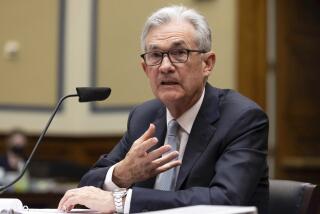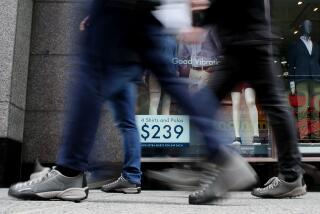Economic Nose-Dive Forecast for the Nation
- Share via
The U.S. economy is descending into something more serious than a cyclical downturn and “obstacles of crisis proportions” in the financial sector could slow recovery, a prominent economist said Monday.
Henry Kaufman, a former managing director of Salomon Brothers Inc. and now an independent consultant with his own firm, told a financial gathering in San Diego that many investments except high-grade bonds were likely to lose value.
“Another business recession is starting,” Kaufman told the Edison Electric Institute 1990 Financial Conference. He warned that “it is dangerous to view the . . . slide merely as a typical cyclical phenomenon.”
The downturn at hand “promises to be highly atypical” given the fragility of U.S. financial institutions, which have lost shocking amounts on bad real estate loans, and debt-burdened corporations.
Present crises notwithstanding, Kaufman’s inclination to seeing the gloomier side of things in the past earned him the sobriquet “Dr. Doom.”
Kaufman said U.S. debt has mounted from 1.7 times the gross national product in 1980 to 2.4 times GNP in 1989. About 27% of corporate bonds are rated as high-risk “junk,” vs. 13% in 1980. Commercial banks credit standings are in shreds, and savings and loans have been decimated.
These and other serious problems present “extraordinary financial obstacles” to a U.S. business recovery, Kaufman said. They “imply that considerable time will be needed for financial recuperation.”
“Now, no vibrancy can return to the economy without first putting in place a rehabilitated financial system,” a step he said will take years of rebuilding eroded bank capital and skewed corporate balance sheets.
In the meantime, the United States must recover from the downturn handicapped by an outsized federal budget deficit, which means “fiscal policy does not have the flexibility to be a stimulative force” on the economy.
As U.S. government bond prices rise, long-term yields--market interest rates--could fall to 6.75% to 7.00% from around 8.75% now, reopening the traditional cycle of new investment and recovery, Kaufman said.
But that dramatic yield decline won’t be seen until the European and Japanese economies falter, easing upward pressure on U.S. rates, he said. “Hopefully, by the time these two countries are in retreat economically, the United States will be in the early stages of an economic recovery.”
More to Read
Inside the business of entertainment
The Wide Shot brings you news, analysis and insights on everything from streaming wars to production — and what it all means for the future.
You may occasionally receive promotional content from the Los Angeles Times.










